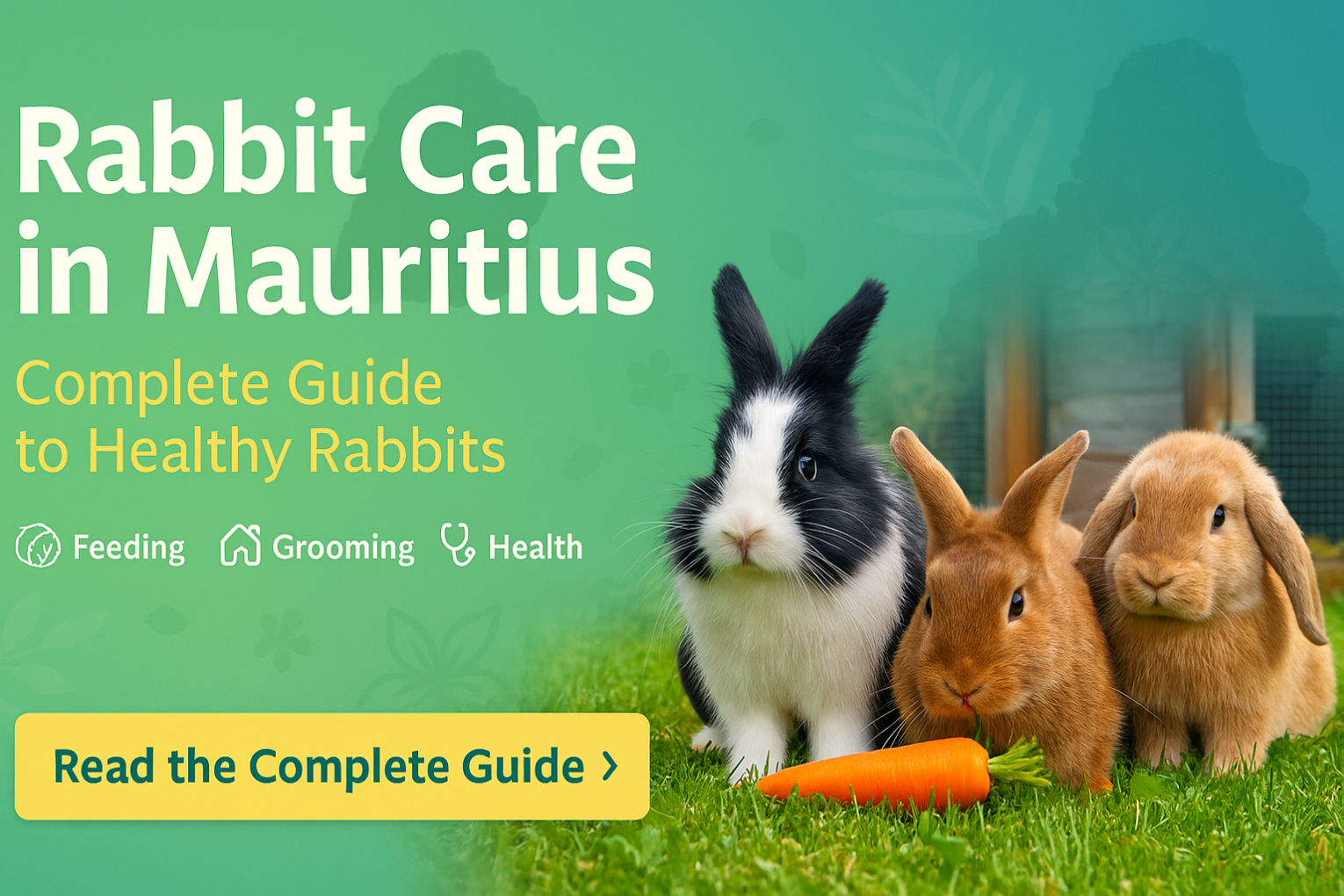
Rabbit Care in Mauritius: The Complete Guide for Pet Owners
Hey there 👋, let’s talk rabbits. If you’ve ever thought about keeping a bunny in Mauritius—or maybe you already have one—you probably know they’re adorable, gentle, and surprisingly smart. But they’re also delicate pets that need the right food, housing, and daily care. So grab a cup of tea, and let’s chat like two friends about everything you need to know to raise a happy, healthy rabbit right here in Mauritius 🏝️.
Introduction: Why Rabbits Make Great Pets
Rabbits are more than just “cage pets.” They’re social, loving, and full of personality. With the right care, rabbits can live 8–12 years (sometimes longer!). In Mauritius, where families live both in houses and apartments, rabbits are becoming more popular because they’re quiet, clean, and can be litter-trained just like cats.
Benefits of Keeping Rabbits
- 🐇 Companionship: Rabbits form bonds with humans and other pets.
- 🌱 Quiet & Clean: Unlike dogs, they don’t bark, and they naturally groom themselves.
- 🏠 Indoor-friendly: Perfect for apartments if given free-roam time.
- 💛 Long lifespan: With care, rabbits live many years.
Rabbit Origins, Colors, Size & Lifespan
Domesticated rabbits come from the European wild rabbit. Over centuries, selective breeding has created a variety of breeds, colors, and sizes.
- Lionhead: Small, fluffy mane, popular in Mauritius.
- Mini Lop: Medium-sized, floppy ears, gentle nature.
- Rex: Velvety fur, friendly and curious.
- Dutch: Distinctive two-tone markings.
Most rabbits live 8–12 years. Small breeds often live longer, while giant breeds may live shorter lives.
Diet & Nutrition: What Rabbits Should Eat
Here’s the golden rule: 80% hay, 10% pellets, 10% fresh veggies & treats. Hay keeps their digestion moving and teeth worn down, pellets like Petslife Premium Rabbit Food 1kg give balanced nutrition, and veggies add variety.
Recommended Products
- 🥕 Petslife Premium Rabbit Food 1kg – daily pellet diet
- 🍎 Vitapol Rabbit Treats – occasional rewards
- 💊 Beaphar Supplements – vitamins & digestion aids
- 🧴 Johnson’s Small Animal Care – healthcare products
Why Do Rabbits Eat Their Own Poop?
Sounds gross, right? But it’s 100% normal. Rabbits produce two types of droppings: 1. Hard pellets – waste. 2. Soft cecotropes – nutrient-packed droppings that they eat directly. This is how they re-digest fibre, vitamins, and protein their body didn’t fully absorb the first time. It’s vital to their health.
Feeding Guidelines
| Life Stage | Diet Focus | Notes |
|---|---|---|
| Baby (under 6 months) | Unlimited alfalfa hay + pellets | High calcium & protein for growth |
| Adult (6 months–5 yrs) | Timothy hay, Petslife pellets, daily veggies | Portion pellets to avoid obesity |
| Senior (5+ yrs) | Softer hay, lighter pellets, supplements | Watch dental health & arthritis |
Your Rabbit’s Enclosure
Forget the tiny cages. Rabbits need space. A good rule: your rabbit should be able to hop 3–4 times and stand fully upright. Best option? A roomy cage plus daily free-roaming indoors or in a secure garden run.
Free Roaming Rabbits
Free-roam bunnies live happier, healthier lives. They exercise naturally, interact more, and show fewer behavioural issues. Just make sure to bunny-proof your home—cover wires, remove toxic plants, and block unsafe corners.
Handling & Bonding
- How to pet: Rabbits love gentle strokes on the forehead and behind the ears. Avoid belly and feet.
- How to pick up: Support chest and hindquarters, keep them close to your body, never dangle by the scruff.
- Bonding tip: Sit on the floor, let them come to you, and reward with a treat.
Exercise, Toys & Training
Bunnies aren’t just “sit in a cage” pets. They love toys, tunnels, chew sticks, and even clicker training. Regular exercise prevents obesity and keeps joints strong.
Try products from our Rabbit Toys Category.
Rabbit Dental Care
Rabbit teeth never stop growing. Without enough hay, teeth overgrow, causing pain and even starvation. Signs of dental issues: drooling, reduced appetite, runny eyes. Solution: unlimited hay, chew toys, and regular vet check-ups.
Behaviour & Training
- Litter training: Place hay near the litter tray—rabbits like to eat & poop at the same time.
- Chewing: Natural behaviour—provide safe chew toys.
- Digging: Provide boxes of shredded paper to satisfy the instinct.
Breeding & Sexing Rabbits
Sexing young rabbits can be tricky—ask a vet for help. If breeding, ensure both rabbits are healthy and unrelated. Pregnant does need extra protein, calcium, and nesting boxes. During breeding:
- Pre-breeding: Boost nutrition with supplements.
- During: Provide more pellets + calcium.
- Post: Support with alfalfa hay for mother & kits.
Rabbit Health Care in Mauritius
Rabbits hide illness well. Key checks:
- Eating & pooping daily
- Bright eyes, clean ears, no discharge
- Regular grooming (especially Lionheads)
- Annual vet visits
Common Health Issues
| Condition | Symptoms | Remedy |
|---|---|---|
| Dental overgrowth | Drooling, weight loss | Vet filing, unlimited hay |
| GI stasis | No poop, no appetite | Emergency vet—fluids, motility drugs |
| Mites/fleas | Itching, fur loss | Beaphar parasite control |
| Heat stress | Panting, lethargy | Cool shaded housing, fans, fresh water |
Why Shop at Petsforhomes.mu?
Here’s why rabbit parents across Mauritius choose us:
- 🐇 All-in-one rabbit care: Food, treats, toys, cages, supplements.
- 🚚 Delivery across Mauritius in 3–5 days, direct to your door.
- 🤝 Trusted brands: Petslife, Vitapol, Beaphar, Johnson’s.
- 💳 Easy payments: Juice, bank transfer, or cash on delivery.
Final Thoughts
Caring for a rabbit in Mauritius is rewarding—but it requires knowledge, patience, and the right products. Focus on fibre-rich diets, free-roam time, gentle handling, and proactive health checks. And when it comes to nutrition and supplies, Petsforhomes.mu is your trusted partner.
Disclaimer: This guide is educational and not a substitute for veterinary advice. Always consult an avian/exotic vet for rabbit health concerns.

